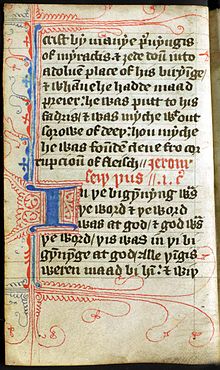Wycliffite Bible
Wycliffe's Bible is the name now given to a group of Bible translations into Middle English that were made under the direction of John Wycliffe. They appeared over a period from approximately 1382 to 1395. These Bible translations were the chief inspiration and chief cause of the Lollard movement, a pre-Reformation movement that rejected many of the distinctive teachings of the Roman Catholic Church. In the early Middle Ages, most Western Christian people encountered the Bible only in the form of oral versions of scriptures, verses and homilies in Latin (other sources were mystery plays, usually conducted in the vernacular, and popular iconography). Though relatively few people could read at this time, Wycliffe’s idea was to translate the Bible into the vernacular, saying "it helpeth Christian men to study the Gospel in that tongue in which they know best Christ’s sentence".
Long thought to be the work of Wycliffe himself, the Wycliffite translations are now generally believed to be the work of several hands. Nicholas of Hereford is known to have translated a part of the text; John Purvey and perhaps John Trevisa are names that have been mentioned as possible authors. The translators worked from the Vulgate, the Latin Bible that was the standard Biblical text of Western Christianity, and the text conforms fully with Catholic teaching. They included in the testaments those works which would later be called the Apocrypha by most Protestants (referred to as deuterocanonical by Catholics), along with 3 Esdras which is now called 2 Esdras and Paul's epistle to the Laodiceans.
Although unauthorised, the work was popular. Wycliffite Bible texts are the most common manuscript literature in Middle English. More than 250 manuscripts of the Wycliffite Bible survive. One copy sold at auction on December 5, 2016 for $1,692,500 USD.
...
Wikipedia

